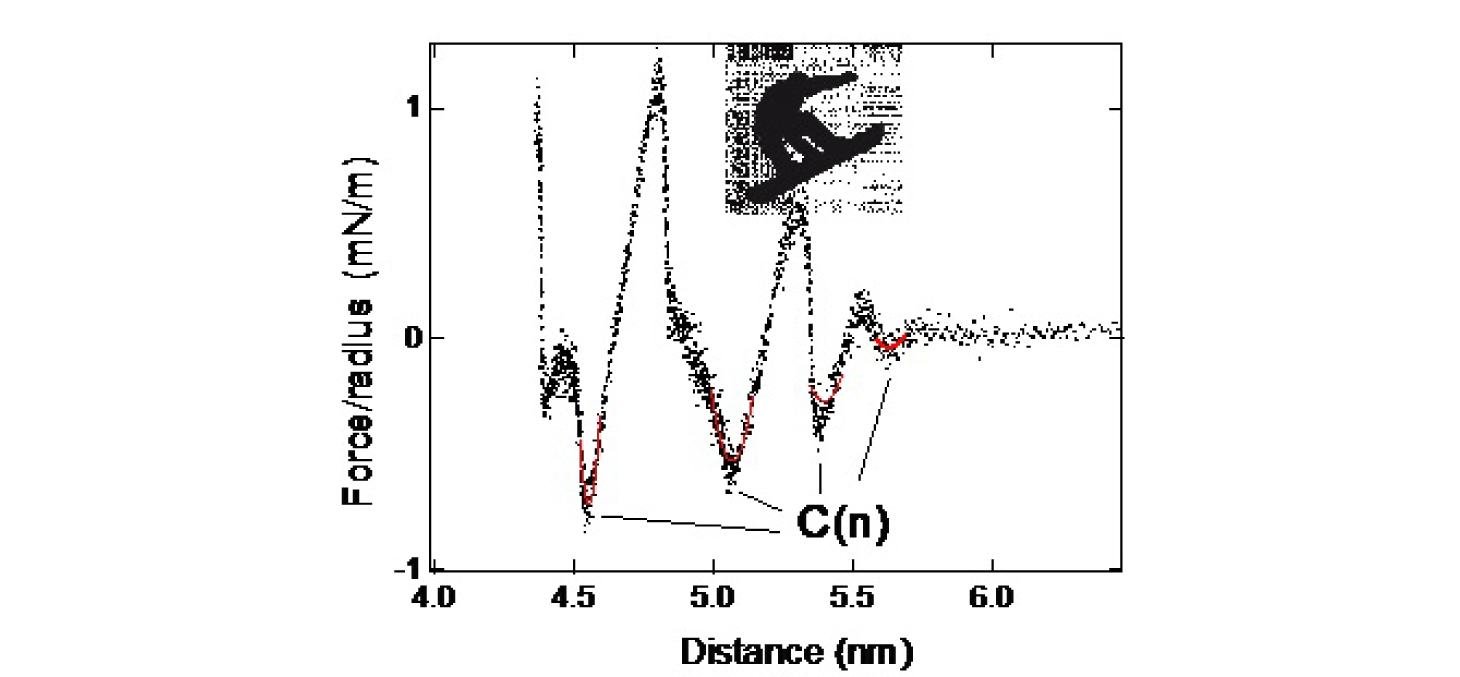- Share
- Share on Facebook
- Share on X
- Share on LinkedIn
Recruitment

Ionic liquids are molten salts at room temperature, and are therefore highly concentrated, solvent-free electrolytes. These materials have numerous applications in the fields of energy (batteries, supercapacitors and other electrical systems), mechanics (they are excellent lubricants) and the environment (pollution control). All these applications are based on the physical and mechanical properties of ionic liquids at interfaces or under confinement, which are not yet well understood.
Among the open questions on these systems, we would like to address the problem of solidification under confinement. Some results suggest that an ionic liquid can solidify when it is placed between two solid surfaces which are close enough [1]. In our team, however, we have not measured any confinement effect, but rather the presence of massive interfacial films whose thickness is independent of the distance between the surfaces [2].
The aim of this internship is to experimentally study the behavior of ionic liquids under confinement in order to understand whether the exotic behaviors of ionic liquids are surface or confinement effects. This study will be carried out using a dynamic Surface Force Apparatus (dSFA, Figure 1) developed in the team [3].
[1] J. Comtet, A. Niguès, V. Kaiser, B. Coasne, L. Bocquet and A. Siria, Nanoscale capillary freezing of ionic liquids confined between metallic interfaces and the role of electronic screening, Nature Mater. 16, 634-639 (2017)
[2] L. Garcia, L. Jacquot, E. Charlaix and B. Cross, Nano-mechanics of ionic liquids at dielectric and metallic interfaces, Faraday Discuss. 206, 443-457 (2018)
[3] L. Garcia, C. Barraud, C. Picard, J. Giraud, E. Charlaix, and B. Cross, A micro-nano-rheometer for the mechanics of soft matter at interfaces, Rev. Sci. Instrum. 87, 113906 (2016)
Expected profile:
The candidate must be motivated by innovative experimental work, with a strong taste for instrumentation development, and a background in at least one of the following domains: (soft matter) physics, (fluid) mechanics, physical chemistry or material science.
Application:
Interested candidates should send their application to benjamin.cross univ-grenoble-alpes.fr (benjamin[dot]cross[at]univ-grenoble-alpes[dot]fr), including:
univ-grenoble-alpes.fr (benjamin[dot]cross[at]univ-grenoble-alpes[dot]fr), including:
- CV
- transcripts from the 1st year of the Master's program.
The internship is expected to start on Spring 2024, and can be followed by a thesis.
Contact
Benjamin CROSS
MODI team
benjamin.cross univ-grenoble-alpes.fr (benjamin[dot]cross[at]univ-grenoble-alpes[dot]fr)
univ-grenoble-alpes.fr (benjamin[dot]cross[at]univ-grenoble-alpes[dot]fr)
Romain LHERMEROUT
MODI team
romain.lhermerout univ-grenoble-alpes.fr (romain[dot]lhermerout[at]univ-grenoble-alpes[dot]fr)
univ-grenoble-alpes.fr (romain[dot]lhermerout[at]univ-grenoble-alpes[dot]fr)
Elisabeth CHARLAIX
MODI team
elisabeth.charlaix univ-grenoble-alpes.fr (elisabeth[dot]charlaix[at]univ-grenoble-alpes[dot]fr)
univ-grenoble-alpes.fr (elisabeth[dot]charlaix[at]univ-grenoble-alpes[dot]fr)
- Share
- Share on Facebook
- Share on X
- Share on LinkedIn